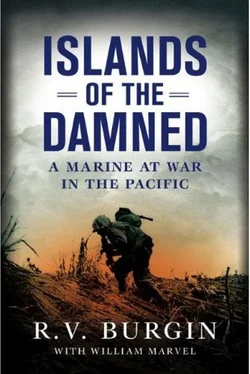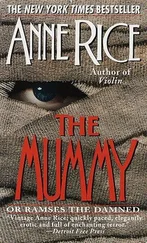* * *
About this time I started having trouble with our platoon leader again, the officer we called Lieutenant Legs. The truth is, a lot of us had been having trouble with Lieutenant Legs since the canned peaches incident on New Britain.
As usual, Legs was making up the rules as he went along. We’d made a practice beach landing and gone in. He told us where to set up the mortars, and we did. Pretty soon a battalion commander came along.
“Who the hell set these up?” he barked at Legs. “Why did you set them up there ?” Just chewed up his butt.
After he was gone, Legs started chewing me out. “What the hell were you thinking, setting up that way?” he yelled. “They’re supposed to be over there!”
He was getting worse. He’d tell us to do something and then he’d chew our ass for doing what he said. It was demoralizing. Our platoon sergeant, Johnny Marmet, knew something was wrong. Finally he called the mortar section together.
“All right, there’s something going on around here and I want to know what the hell it is.”
He went down the line, asking each man if he had a gripe. “Whatever the hell is on your mind, I want to hear it.”
Some didn’t have a problem with Legs. But some of us definitely did. I was the last one. Marmet dismissed everybody else. I was sitting there, and he said, “Burgin, what is it? What’s going on in this outfit?”
“John, Legs has been riding us for the stuff he’s been doing ever since New Britain,” I said. “He’s passing down the blame to me and everybody else for his own damn mistakes. I’m going to tell you something, John. You get that son of a bitch off of my ass or I’m going to get him off. And if I get him off, both of us are going to be sorry.”
Marmet just said, “I’ll take care of it.”
And he did, I guess. Because after that Lieutenant Legs didn’t give me any more problems for a long time.
A sergeant could do that—you’d better believe it. The first sergeant, gunny sergeant, he pretty well runs the company. Whatever he said went.
He’d just say, “Lieutenant, I need to have a word with you.” A wise lieutenant would listen. Because if he didn’t the sergeant would go to the captain and say, “Hey, we have a problem with Lieutenant So-and-So. This is what he’s doing, and it’s not right. And he’s not listening to me.”
Before long it would be fixed. The word of a sergeant carried a lot of weight. Yes, it did.
I had no trouble with other officers. Sledge, in his book With the Old Breed , was too hard on officers, in my opinion. But even Sledge liked Hillbilly Jones. We all liked Hillbilly.
First Lieutenant Edward A. Jones had been with us on New Britain, and he would be with us on Peleliu, for a time. He was the most—I don’t know what the word is— disciplinary officer I was ever around. He wasn’t a horse’s patoot. He didn’t make up his own rules. He went by the book. His mind-set was, You’re a Marine, and you’re going to act like a Marine whether you’re in the States or out here in combat. That’s the way it’s going to be.
Whenever we’d fall in for morning roll call, standing in ranks, he’d be out in front and he’d inspect the rifles. He’d spent five years as a seagoing Marine, so he was sharp. I mean he would pull that rifle— snap! —and twirl it— snap! —and it would come back to you— snap! He had it all. When you fell in, your collar was buttoned, your cuffs were buttoned. You stood erect. You didn’t slouch. You stood like a Marine. From reveille to recall in the afternoon he was as GI as they ever came, I’ll guarantee you.
But after recall turned us loose at four o’clock, Hillbilly was a different human being. He’d wander down to our tents carrying the guitar he always had with him and sit around and we’d sing and shoot the bull all night. Coming over from New Britain, we’d gather around Hillbilly on the deck of the Elmore singing one song after another. “Waltzing Matilda” was popular, from our stay in Melbourne. We sang “Danny Boy,” and “She’s Nobody’s Darling But Mine.” My own favorite was “San Antonio Rose.”
For some reason I always thought Hillbilly was from West Virginia, because he knew every country and western song. The fact of it is, he was from Red Lion, Pennsylvania, right on the Maryland border. Hillbilly was the leader of K Company’s machine-gun platoon, and the kind of officer you always wanted to have somewhere near you in a battle. He was soft-spoken, always calm and reassuring. Nothing rattled him. When everybody else was sweating and filthy, Hillbilly always looked fresh scrubbed. None of us knew how he did it.
They were working us harder now. More marches, more drills, more inspections. We all knew they were getting us ready for something, toughening us up. In July signs appeared in the galleys: KILL JAPS! KILL JAPS! We’d heard Colonel Lewis “Chesty” Puller posted them. He’d lost a brother in the fighting on Guam.
We were pulling more maneuvers. Just at the squad level first, then working up to platoons, and finally companies. You couldn’t maneuver with anything larger than a company on Pavuvu. The island was only ten miles long and six miles wide. There was a low hill in the center, covered with jungle. That didn’t leave much wiggle room for fifteen thousand Marines and their weapons to pull maneuvers at the same time. One unit would be doing close-order drill and another would come along and march right through it, neither paying any attention to the other. The weapons ranges were in constant use, always some unit waiting to get on. If they ever lined all of us up to hike, we were sure the front of the column would come right up to the back of the column. We’d be like a snake chasing its tail.
After breakfast most mornings the mortar section would go out for a training exercise. We wanted to teach the new guys just as the Guadalcanal veterans had taught us. We showed them what to do and what not to do in combat, we told them what to look for, all the Jap tricks. We’d work on how and where to set up the guns. We’d have them humping ammunition. Of course they’d been through it all before at boot camp. They knew the routine. But we’d practice it, carry it out and practice it again.
I don’t know who in the Marines dreams up all that stuff in your training. Like jerking you out of your sleep and doing a forced run or a forced march. But they do a very good job of it. I don’t think I can stress it too much: They don’t only train you physically. They train you mentally. They know if they can make you upset about something, if they can aggravate you, they’re getting you in the right frame of mind for combat. They throw something unexpected into the agenda, so that when you get on the battlefield you’re already mad. You’re ready to get out of all that you’ve been going through, all that BS you’ve been doing. You’re ready to kill someone.
Some thought it was all BS, the whole four months we spent on that island. I wasn’t on the same page with a lot of guys who downgrade Pavuvu. When you look back on it, the Marines knew what they were doing. We were glad when it was over, even though we knew we were facing death where we were going. In a way, anything would have been better than Pavuvu.
* * *
Around July 4 a few of us caught a break.
Captain Andrew Allison Haldane—we called him “Ack-Ack” on account of his initials—called nine or ten of us in. He had a special assignment for us. Besides myself, there was Hillbilly Jones, John Teskevich, Jim Day, George Sarrett, Paul R. Yarborough, P. A. Wilson and a few others.
Captain Haldane had been K/3/5’s commander the night we fought off five banzai charges on New Britain. They’d awarded him the Silver Star for that. He was as well liked as any officer I knew. I never heard him raise his voice at any man. He was firm, but he was a gentleman, and compassionate.
Читать дальше











